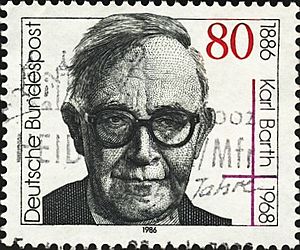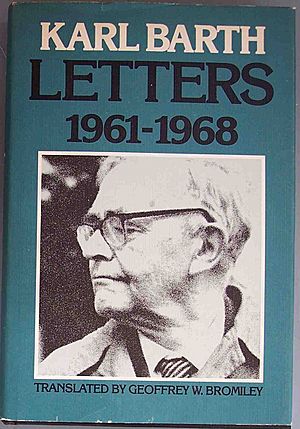Karl Barth facts for kids
Quick facts for kids
Karl Barth
|
|
|---|---|

German stamp, showing Karl Barth
|
|
| Born | May 10, 1886 |
| Died | December 10, 1968 (aged 82) Basel, Switzerland
|
| Occupation | Theologian, author |
|
Notable work
|
The Epistle to the Romans Church Dogmatics |
| Spouse(s) |
Nelly Hoffmann
(m. 1913) |
| Children | Franziska, Markus, Christoph, Matthias and Hans Jakob |
| Theological work | |
| Tradition or movement | Reformed Neo-Orthodoxy |
| Notable ideas | Dialectical theology analogia fidei |
Karl Barth (born May 10, 1886 – died December 10, 1968) was a Swiss theologian. He is often seen as one of the most important Protestant thinkers of the 1900s. He played a big part in writing the Barmen declaration in 1934, which spoke out against the Nazis. His ideas were so important that he was even featured on the cover of Time magazine in 1962.
Barth wrote many books and had a huge impact on how people thought about religion. His most famous books are The Epistle to the Romans and his very large, thirteen-volume work called Church Dogmatics.
Contents
Early Life and Education
Karl Barth was born in Basel, Switzerland, on May 10, 1886. His father, Johann Friedrich "Fritz" Barth, was a theology professor and a pastor. Karl started his studies at the University of Bern. He then went to the University of Berlin and the University of Tübingen, before finishing his studies in Marburg.
Career and Influence
Barth started his career as a pastor in a small Swiss town called Safenwil. People there called him the "Red Pastor from Safenwil." During this time, he began to disagree with some of the common religious ideas he had learned. This led him to write his first important book, The Epistle to the Romans, in 1919. In this book, he shared new ways of understanding the New Testament.
In 1935, Barth was forced to leave Germany. This happened because he refused to sign an oath of loyalty to Adolf Hitler without making changes to it. He then returned to Switzerland and became a professor in Basel, where he taught until 1962.
Barth's ideas influenced many important people, including Dietrich Bonhoeffer, who was part of the Confessing Church that opposed the Nazis. He also influenced other thinkers like Jürgen Moltmann and Hans Küng, and even writers like Flannery O'Connor. His work also had a big effect on modern Christian ethics, which is about how Christians should live and make moral choices.
Later Life and Views
After World War II ended, Karl Barth became an important voice. He encouraged Germany to admit its mistakes and for churches around the world to make peace. In 1947, he helped write the Darmstadt Statement. This statement was more direct about Germany's guilt and responsibility for the Nazi actions and the war. He pointed out that the church's support for certain political groups had made it open to Nazi ideas.
During the Cold War, this statement caused some arguments. Some people in the West disagreed with it because they were against Communism. In the 1950s, Barth supported the peace movement and was against Germany rearming its military.
Personal Life
In 1913, Karl Barth married Nelly Hoffmann, who was a very good violinist. They had five children: a daughter and four sons. Two of their sons, Markus and Christoph, also became important religious scholars. While teaching in Göttingen, Germany, Barth met Charlotte von Kirschbaum. She became his secretary and assistant and helped him a lot with writing his huge book, Church Dogmatics.
Death
Karl Barth passed away on December 10, 1968, at his home in Basel, Switzerland.
Center for Barth Studies
Princeton Theological Seminary in the United States has a special place called the Center for Barth Studies. This center helps people study Karl Barth's life and ideas. It was started in 1997 and holds meetings and events. It also has the largest collection of Barth's works in the world, including many of his original writings.
Images for kids
See also
 In Spanish: Karl Barth para niños
In Spanish: Karl Barth para niños
 | Bayard Rustin |
 | Jeannette Carter |
 | Jeremiah A. Brown |





